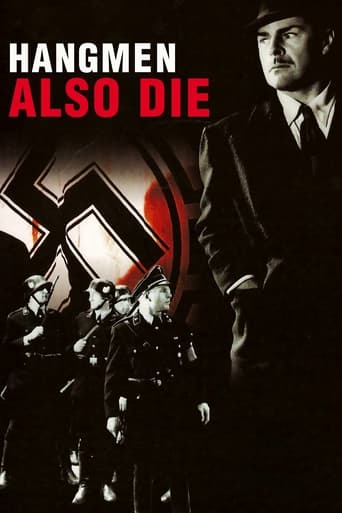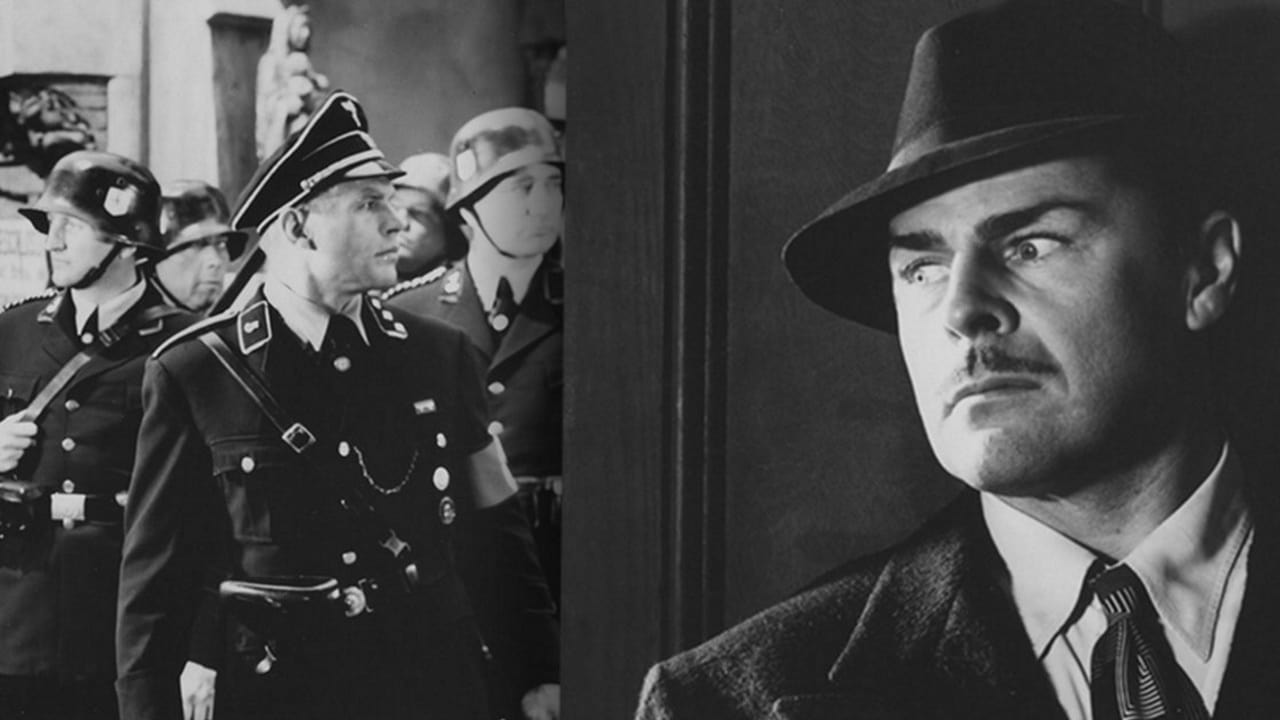Miles-10
"Hangmen Also Die!" was made during World War II about an event—the assassination of Nazi leader Reinhard Heydrich in Czechoslovakia— that had taken place only the year before the movie's release. So close to the event, and with the facts still classified, the filmmakers felt entirely free to make up their own version of what occurred. Since that time, at least three films about this assassination have been made, all more or less telling the same story as each other, which is very different from the one told here.The filmmakers here were the great director Fritz Lang, the scenarist Bertolt Brecht, the cinematographer James Wong Howe, and a good cast including Brian Donlevy, Walter Brennan (unusually but effectively cast as a Czech professor) and Anna Lee. The story is intricately plotted, suspenseful and inspiring if fanciful.The first surprise is that, unlike later versions, this film skips over the assassination itself, opening with a scene showing Heydrich's (Hans Heinrich von Twardowski) cruelty—he intends to execute 500 factory workers for poor production numbers—but then jumps to several minutes after the assassination. I had to wonder whether a reel was missing (even though this version was beautifully restored in 2012), but the film deliberately deals primarily with the aftermath of the assassination. It is a story about collaboration versus resistance to a foreign invader. The Czech underground is behind the assassination but is infiltrated by a collaborator. The Nazis round up people they will execute every day at first—and later twelve times a day—until the Czech's betray the assassin. In a fine scene, the assassin, Dr. Svoboda (Donlevy), tells the leader of the underground, Dedic (Jonathan Hale), that he wants to turn himself in to save the hundreds of men who will be executed, but Dedic presents the argument that, since Svoboda was chosen as the assassin to represent the Czech people, if he turns himself in, it is as if he surrenders the whole country to the Nazis.Meanwhile, Gruber (Alexander Granach), the Gestapo Inspector in charge of the investigation, cleverly closes in on the conspirators, even seeing through the smoke screens that they throw up for his benefit. The outcome is nevertheless more hopeful than the historical record.The tame movie conventions of portraying Nazi atrocities were still uninformed by reality in 1943. More people were more relentlessly slaughtered in retaliation for Heydrich's assassination than this film shows. For that matter, when members of the underground suffocate a Nazi under a pile of towels, it takes no time at all. This probably seemed horrible enough to 1940s moviegoers, whereas, if anything, today's movies might be more apt to exaggerate how long it takes to smother someone.Despite being made after Hollywood established its morality code, the movie toys with the notion of sex outside of marriage even though it is only part of a ruse to fool the Gestapo. Also, some characters are clearly meant to be prostitutes.The message of this film is that Czech patriots can mount their resistance without any outside help. The only nod to historical fact is that the assassin's pistol is British-made, but we are not told how the homegrown resistance came by it. In reality, all of the weapons used by the assassins were British. There was not a lone assassin, and all of the assassination team members were Czechs who had been living in exile in Britain and had to be parachuted back into Czechoslovakia. Contrary to this movie, Heydrich was not killed by bullets from a gun but died as a result of a grenade that landed behind his car seat and propelled horsehair upholstery, along with shrapnel, into his back. He suffered in agony until doctors were able to give him painkillers, but, without antibiotics, even Hitler's personal surgeon was unable to save him.Like a less funny version of "To Be or Not to Be," this cleverly plotted and beautifully photographed thriller works better dramatically than the true story. Well worth seeing, even if its history must be taken with a large grain of salt.
rooee
"Die if you must for a cause that is just." It's a line from a poem which becomes a song of defiance, written by a Czech civilian taken hostage by and awaiting execution at the hands of the Nazis. It's also the core mantra for many of the Resistance heroes who face death for the sake of the greater national good. The plot of Fritz Lang's film, adapted from a story by Bertolt "Bert" Brecht and loosely based on real events, concerns the assassination of the "Hangman of Europe" Reinhard Heydrich (Hans Heinrich von Twardowski) in occupied Prague. Naturally the Gestapo are all over the case, but their efforts to nail the assassin are thwarted at every turn by Resistance sympathisers – many of them ordinary folk turned potential betrayers. The chief inspector is Gruber (Alexander Granach), a bawdy, beer- swilling cop with a nose for sniffing out lies. But the prime suspect, Svoboda (Brian Donlevy), is his intellectual equal, casting a web of deceit that entangles innocent witness Mascha (Anna Lee), whose father is subsequently captured and used as leverage. Mascha's dilemma is a Sophie's Choice that encapsulates the terrible decision at the heart of all citizens living under oppression: Speak out and her family will be shot; say nothing and only her father dies. Hangmen Also Die! was made after Lang's emigration from Nazi Germany in the 1930s and before his move into hard noir with Scarlet Street and The Big Heat. It was produced during wartime yet somehow avoids many of the demonising clichés that could potentially turn depictions of the Third Reich into a pantomime of evil (even if some of the performances are a tad broad). The precision and nuance by which such a complex array of characters is mapped out is remarkable – the stuff of AAA television in our current era. Lang and his co-writers somehow make it all work, with virtually every scene a nail-biting moral or ethical decision, or some devastating revelation. It's the leanness of the narrative, with every word and frame employed to maximum effect, that makes this level of intensity possible. Special mention should go to the great female roles here, from factory workers to fruit sellers, all taking their punishment for their part in the Resistance effort. Mascha in particular could have been a hysterical wuss, but she's as calm, capable, and principled as the men plotting each other's doom. She never asked for this – yet she's the one making the sacrifice regardless.The mix of political intrigue, melodrama, and hard-boiled noir may not sit comfortably in many minds but on screen it's a masterful balancing act. Just as with M, Lang dares to paint his subjects in shades of grey (the Resistance fighters are no more pure of heart than the Gestapo police are pure evil), and the results are utterly engrossing and grimly plausible. If you've seen Lang's big-hitters, it's time to try out this lesser-known little classic.
gavin6942
During the Nazi occupation of Czechoslovakia, surgeon Dr. Franticek Svoboda (Brian Donlevy), a Czech patriot, assassinates the brutal "Hangman of Europe", Reichsprotektor Reinhard Heydrich (Hans Heinrich von Twardowski), and is wounded in the process. In his attempt to escape, he is helped by history professor Stephen Novotny (Walter Brennan), who is himself under suspicion by the Nazis, and his daughter Mascha (Anna Lee).I am sad that Dwight Frye has such a small (uncredited) role, and I am sad that this film was banned by the McCarthy era politicians. That just shows how crazy they were. Why would they ban a film that stands up against Hitler and contains an awesome punch through a window? The film portrays Nazis in the stereotype that we expect of them today. Yet, this was still 1943... so this film deserves credit for influencing how we view the Nazi regime, and also for being based on a true story in the middle of a war rather than after the fact. (Had the outcome of the war gone differently, this film would have been quite the problem.)
mukava991
Considering the complicated and fascinating back story of this production (how the Hollywood system represented by producer Arnold Pressburger and director Fritz Lang undermined the intentions of scriptwriter Bertolt Brecht in his first and only US film effort), it's amazing not only how effective the final product turned out to be, but how well it holds up after several decades. Yes, it's melodramatic; yes, there are Langian tricks; yes, the villains are extreme types; yes, there is sentimentality; yes, there is slick over-simplification and distortion of fact – but it still works powerfully as a tale of innocent people (the Czechs) fighting against a powerful aggressor (the Nazis in the early days of World War Two).If you're going to make a movie about Nazis, it certainly helps if the writers are German, and the story by Lang and Brecht fills that bill. So there is a living, breathing familiarity with the subjects, with significant sections delivered in German, effectively giving non-German- speaking audiences a sense of the alienation the Czechs felt from their occupiers. There are four main Nazi villains, each one of whom leaps off the screen. We start with Hans von Twardowski as Reinhard Heydrich who creates a memorably vicious, almost comically cruel autocrat, the kind of hateful person one wouldn't mind killing. And we don't have long to wait because his assassination is what sets the whole plot in motion. We are then presented with three finely etched Gestapo figures, each horrendous: Tonio Selwart, a well- groomed, perfectly tailored, ramrod straight martinet given to chain smoking and examining a large pimple on his cheek while conducting his bloody business; Reinhold Schunzel, flabby faced, gravel voiced and highly strung, who pops his knuckles and slurps tea while interrogating his victims; Alexander Granach, the unshaven, beer guzzling, skirt-chasing Inspector Gruber. And then we have Gene Lockhart, the epitome of small-minded corruption, as Emil Czaka, a businessman who betrays his own people. Walter Brennan is appropriately noble as Prof Novotny, lean and lithe and stoic as he is taken hostage after Heydrich's murder. Even the splendid Dwight Frye shows up briefly but strongly as a Czech hostage.Brecht and Lang are said to have disliked poor Anna Lee, who plays the young daughter of Prof. Novotny. Even if one is unaware of the nasty stresses unfairly imposed upon her during filming, one gets the sense that the weak moments in her performance result as much from the script and direction as from any lack of ability on her part. Brian Donlevy as the hero of sorts, was never a very interesting leading man but there is so much intrigue going on around him that his casting does no harm. Speaking of intrigue, a scheme that is hatched by the Czech underground to trap Czaka is so intricate and masterful (and implausible) that one cannot help but recall the diabolical maneuverings of Lang's 1922 creation, "Doktor Mabuse, der Spieler." "Hangmen," like much of the silent "Mabuse," also has an in-studio look, largely due to the fact that Lang had to work with a skimpy budget. The "street" scenes are obviously fake but what goes on in those "streets" is so compelling we are persuaded to ignore their obvious fakery. James Wong Howe's noirish cinematography is a plus under these constrictions.There is no way to know if a better film would have resulted had Brecht prevailed, so we're stuck with what we have: an action flick instead of an epic social drama. Despite flaws it's still one of the better World War Two era thrillers.



 AD
AD



